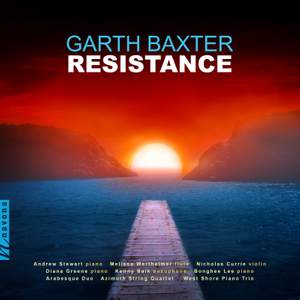Composer Garth Baxter calls his commitment to form and aesthetic "modern traditionalism." And indeed, his new album Resistance may just offer the best of both worlds in one captivating experience. Each piece has certain features in common: they are immediately, intuitively accessible to the listening ear, and all of them draw upon Baxter's ability to evoke sincere emotions with every note. The compositions that make up Resistance each come with a story to tell. Starting off the album is The Silver Run, a soaring depiction of The Silver Run area in Maryland as told by the voices of flute and piano. This stunning soundscape is followed by the passionate Could You Dream What I Dream for violin and piano, matched only in romantic quality by Romance Without Words and Il y a Longtemps ("Long Ago"). This expression of love is followed by Des Larmes Encadrées (“Framed Tears”), a sentimental reflection inspired by his familial ties with a fellow artist who plays the saxophone. Resistance, the title track, is a triumphant stance in favor of tonal, lyrical music in an age of atonality and the breakdown of harmony. Its power is balanced by the dark yet deeply moving story of MacPherson’s Lament, inspired by Scottish fiddler James MacPherson and his last composition, written just before his hanging. On the other hand, Ballade For A Princess, inspired by Chopin’s Fantasie-Impromptu, reflects the beauty and romance portrayed in so many of that Romantic composer’s compositions. These powerful, moving sentiments are tastefully balanced by the guitar duo Edgefield, in which Baxter melds traditional rhythms with a highly innovative yet understandable way of modulating through different keys. From the Headwaters aptly brings Resistance to a close, tying in the harmonies of its predecessor with the lyricism of the rest of the album. One could almost imagine that, were Brahms alive and composing today, this is what his music would sound like.





